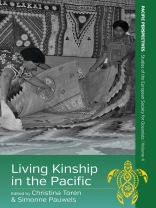Unaisi Nabobo-Baba observed that for the various peoples of the Pacific, kinship is generally understood as “knowledge that counts.” It is with this observation that this volume begins, and it continues with a straightforward objective to provide case studies of Pacific kinship. In doing so, contributors share an understanding of kinship as a lived and living dimension of contemporary human lives, in an area where deep historical links provide for close and useful comparison. The ethnographic focus is on transformation and continuity over time in Fiji, Tonga, and Samoa with the addition of three instructive cases from Tokelau, Papua New Guinea, and Taiwan. The book ends with an account of how kinship is constituted in day-to-day ritual and ritualized behavior.
Daftar Isi
List of Illustrations
Introduction: Kinship in the Pacific as Knowledge that Counts
Christina Toren and Simonne Pauwels
Chapter 1. The Mutual Implication of Kinship and Chiefship in Fiji
Unaisi Nabobo-Baba
Chapter 2. Pigs for Money: Kinship and the Monetisation of Exchange among the Truku
Ching-Hsiu Lin
Chapter 3. Fijian Kinship: Exchange and Migration
Jara Hulkenberg
Chapter 4. Gendered Sides and Ritual Moieties: Tokelau Kinship as Social Practice
Ingjerd Hoëm
Chapter 5. Tongan Kinship Terminology and Social Stratification
Svenja Völkel
Chapter 6. ‘I suffered when my sister gave birth.’ Transformations of the Brother–Sister Bond Among the Ankave-Anga of Papua New Guinea
Pascale Bonnemère
Chapter 7. The Vasu Position and the Sister’s Mana. The Case of Lau (Fiji)
Simonne Pauwels
Chapter 8. Sister or Wife? You’ve Got to Choose. A Solution to the Puzzle of Village Exogamy in Samoa
Serge Tcherkézoff
Chapter 9. The Sister’s Return. The Brother-Sister Relationship, the Tongan Fahu and the Unfolding of Kinship in Polynesia
Françoise Douaire-Marsaudon
Chapter 10. How Would We Have Got Here if our Paternal Grandmother Had Not Existed? Relations of Locality, Blood, Life and Name in Nasau (Fiji)
Françoise Cayrol
Chapter 11. How ritual articulates kinship
Christina Toren
Notes on Contributors
Tentang Penulis
Simonne Pauwels is a Researcher at CNRS and the adjunct Director of CREDO. Before working in Fiji, she conducted research in Eastern Indonesia for many years and, besides a number of articles, has written Metanleru, un voilier prédateur: Renommée et fertilité dans l’île de Selaru (2009) and D’un nom à l’autre en Asie du Sud-Est, Approches ethnologiques (co-edited with Josiane Massard-Vincent, 1999).












